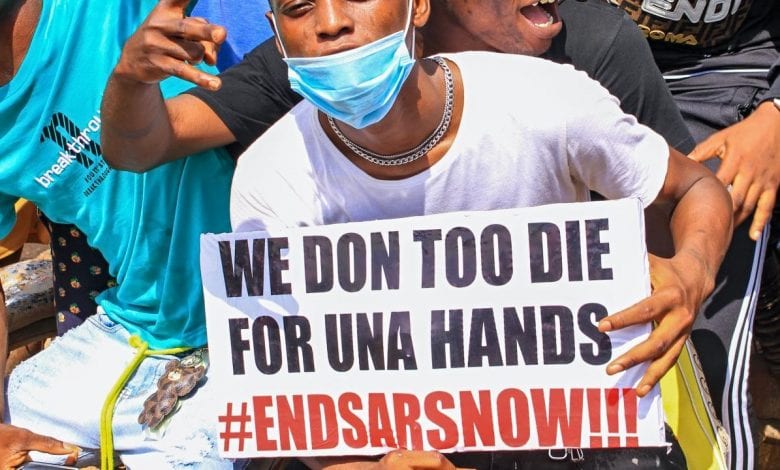
A new dawn broke in Nigeria on Thursday 8th October, 2020 when youths trooped to the streets to protest against police brutality, inhumane treatment, illegal arrest and detention, extra-judicial killing and all others forms of mal-treatment in the hands of police operative across the country.
The nationwide protest came under the banner of ENDSARS movement, using the internet social media as the medium of strategic communication, mobilization and rallying point of departure. Moreso, the message of the youths to the Nigerian state was loud, clear, and stand a reason.
A reason of reality ,that both the youths, and olds battle silently and openly. In this case, the reality, which we live in are complex and many-sided, not simple or linear. If may put this point subjectively. Police brutality and l don’t care attitudes of the Nigerian state, became a decisive choice agitation for the Nigerian youths.
A fundamental and critical bid that has become global attraction but irritating to the Nigerian state and a large section of her non-productive class elites fraction. Although, the opposition class elites segment not controlling state apparatus, see, the protest as opportunity to deconstruct and narrow the narrative for 2023 election spoils.
Critically, l submit that the lucidity of political economy especially the not elusive to understand the Nigerian state. We relate this to the youths protest learning to differentiate between the ideological and political economy that hold the Nigerian state together. In addition, we may also be tempted to disagree with the liberal democrats, humanist, conservative and reactionaries , that are in all, part of the embodied. However, as I shall state here “whether Nigerian politico-economic system is textbook capitalist maybe questioned on the theoretical ground, but the country does not exist in isolation”.
Incidentally, as a point of departure in an atmosphere of de-industrialization, government ineptitude, widen inequality, hunger, poverty, bad governance, corruption, suspicion and trust deficit between the citizens and political functionaries in today Nigeria. An army, of youth’s employed or unemployed swarms all over the cities of Nigeria demanding what is considered their rights. While, solution from the government is lacking, concerns for human rights is poor, provision for livelihood sustenance is in shortage, wealth creation and development is no were near and satisfactory. Indeed, this, are core governmental function, that the inept federal, state and local government in Nigeria absconds from performing.
Consequentially, the Nigerian elite fraction struggle over our national wealth and assert, this for instance has no ethnic colouration parties to control big region with which they could launched development or robust economy programmes. Rather, the language of politics they have successfully deployed is to loots and distributes state and national resources among ethnic cronies not even with the entirety. To this end, these bring us to the clarity, I earlier posit as the ‘lucidity’, of political economy of the Nigerian state. A situation that provide, “systemic and systematic economics abuse by the Nigerian elites nurtured in conjunction with representatives of international monopoly capital”.
Meanwhile, Nigerian drifting at a very high speed with deep-sited problems cannot be disassociates from capitalism. In clearly measures, nobody can denial that the Nigeria political economy is not fully capitalist presently. It is glaring with obvious forces by way of representatives of the global economy. It is well established fact the Nigerian state is first a colonial, and then, neocolonial and non-autonomous capitalist state after flag independent since 1960, currently sixty years but exist as underdeveloped and dependent nation.
The argument of Nigerian being a capitalist does not rest only on her role as a producer and high earning from crude oil, the lucidity is her links with the world economy, though from a peripheral position, and forcefully from what define the routine processes of her political economy that birthed the nature and violent character of the Nigerian state.
In this way we could understand the youths protest as well as comprehend the authoritarian and violent character of the Nigerian state. Consequently, in clear perspective, the Nigerian state appears most critical in its relations with any section of the subordinate class, were the youths in this respect in a glaring day break demonstrate a capacity to unmask it character, question its legitimacy and engage in resistance.
At this point, hence, the thousands of Nigerian youths from Lagos, Ibadan, Port Harcourt, Benin, Delta, Ijebu, Abeokuta, Aba, Maiduguri, Kaduna, Makurdi, Abuja, Mararaba-Nasararwa state and many others in there enlightened and educated mode dare the state. However, the Nigerian state put in particular target of measures of an authoritarian, capitalist state.
The implication of this is that we must avoid the total unfamiliarity to the Nigerian state violent character, or at best her ideological views of political economy from the prism of extent typical neoliberal political economy state. In fact, this has draw attention that all the mainstream political parties, CSOs, NGOs in Nigerian today and even some radical-sounding formation endorse the ‘neoliberal capitalist political economy and its philosophy’.
Subsequently, what they cannot escape from and battle silently, is what the youth’s troop to the street to demand, but the Nigerian state responded with a full weight of state violent.
